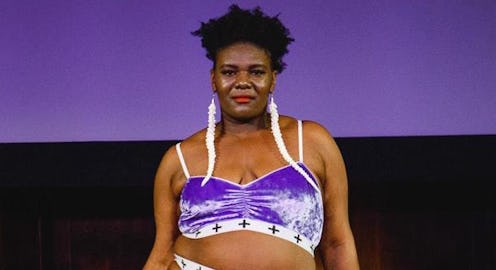
On the stage of Unmentionable: A Lingerie Exposition in Portland, Oregon in February 2016 stood seven plus size women wearing Chubby Cartwheels lingerie. They each walked the runway in luscious velvet and mesh fabrics — their love handles, visible belly outlines, and back rolls radical in their visibility. In a time when size still seems to conjure up assumptions about one's moral compass, or health, or class, or, yes, levels of attraction, refusing to hide one's body — or to push boundaries further by actually celebrating and showcasing that body — undoubtedly becomes a political statement.
When it came time to conclude the show, however, the inherently political nature of the presentation took an even more poignant turn. As the models prepared for their final walk, every woman showed up armed with a protest sign: Signs featuring slogans like "No Ban No Wall," "no US without Muslims," "Black Lives Matter," "clean water for Flint," and "climate change is real."
"I’ve been feeling so frustrated with the current political climate of the U.S. and the world right now," designer Shawna Farmer tells Bustle. "I always have felt that if you have a platform, an audience, or following of any size, [you should] use it for what you believe to help spread awareness. I know of a lot businesses choose to stay silent on political topics as to not alienate customers, but since my business and my personal life are very much connected through my brand, I had to share my views."
The idea of the protest signs came in the lead-up to the show, when Farmer was feeling helpless despite signing petitions, sharing articles and stories via social media, and donating money to worthy causes. While she believes all of these are noble, valuable actions, she couldn't quite shake the feeling that pretty literally screaming one's frustrations right now — in front of folks likely harboring many of the same ones — has just as much of a place.
"So I asked one of the producers of the show, Cassie, if it would be OK for my models to hold up protest signs for issues I know we all are passionate about on the final walk," Farmer adds. "She responded to me immediately saying absolutely [...] and when it came time to the final walk for my line at the show, the crowd responded so amazingly. The models got a standing ovation from the crowd. It was really reassuring to know so many people are there and in support of all those issues, too."
The Chubby Cartwheels show was an opportunity in more ways that one. As so many of us brace ourselves for the changes that might come of the next four to eight years, it's crucial to carve out space for marginalized communities. It's crucial to remember that fat people — like so many people of other identities — are also frequently denied rights (from healthcare to proper legal proceedings to equal pay).
Farmer chose to celebrate an array of women who have likely all been told that their bodies are wrong/flawed/grotesque at some point throughout their lives. To campaign against fat shaming might not feel like the top of the priority list right now, and it probably shouldn't. But when fatness intersects with other breeds of oppression — be it gender, sexuality, race, or class — it becomes all the more likely for one to be targeted.
Now, more than ever perhaps, is an opportune time to fight against such BS. "I think [when you're fat], making yourself visible or even hyper-visible, anything outside of the mainstream 'norm,' is very political," Farmer tells Bustle. "You are challenging the status quo." And you are normalizing facets of identity that folks still insist on dubbing abnormal.
"The more we normalize it, the more people will become comfortable with it," Farmer adds. "It’s necessary to help break the mainstream image of what a fat body looks like. Fat bodies are not all smooth hourglasses," and they shouldn't have to be.
That the models were wearing lingerie made things all the more bold. Culturally, fat women are generally either desexualized or hyper-sexualized by outside parties. They are depicted as lonely spinsters or desperate floozies. These women, however, read as none of that. Instead, they radiate autonomy and empowerment despite being told they don't deserve such power. In the words of Farmer, nothing is more striking than wearing "what makes you feel good and makes you happy. And fuck anyone who tries to tell you otherwise."
Sometimes, the political climate of the times does not allow for passivity. When people are feeling afraid for their lives because of their gender identities, because of their immigration status, because of their religion or the color of their skin, staying silent shouldn't really be an option. Farmer's show served as a reminder of the simple fact that it's OK to talk about it all. It's more than OK, in fact. It's essential.